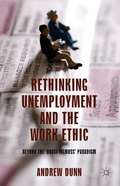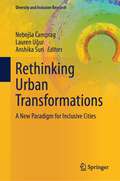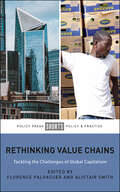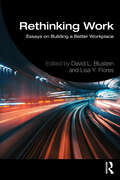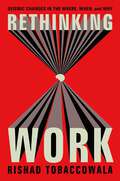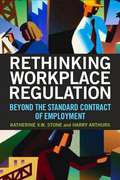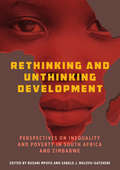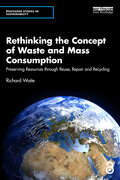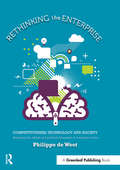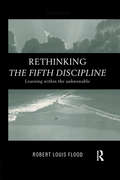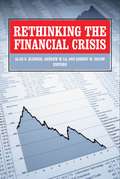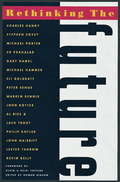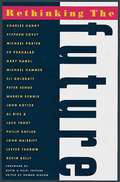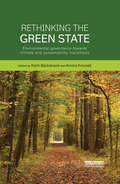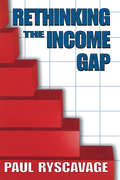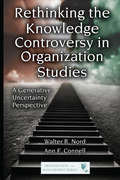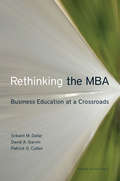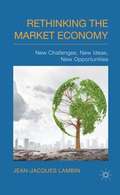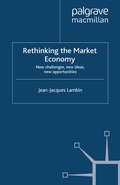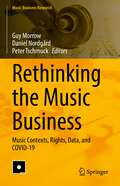- Table View
- List View
Rethinking Unemployment and the Work Ethic
by Andrew DunnWhile recent Labour and coalition governments have insisted that many unemployed people prefer state benefits to a job, and have tightened the rules attached to claiming unemployment benefits, mainstream academic research repeatedly concludes that only a tiny minority of unemployed benefit claimants are not strongly committed to employment. Andrew Dunn argues that the discrepancy can be explained by UK social policy academia leaving important questions unanswered. Dunn presents findings from four empirical studies which, in contrast to earlier research, focused on unemployed people's attitudes towards unattractive jobs and included interviews with people in welfare-to-work organisations. All four studies' findings were consistent with the view that many unemployed benefit claimants prefer living on benefits to undertaking jobs which would increase their income, but which they find unattractive. Thus, the studies gave support to politicians' view about the need to tighten benefit rules.
Rethinking Unequal Exchange
by Salimah ValianiRethinking Unequal Exchange traces the structural forces that have created the conditions for the increasing use, production, and circulation of temporary migrant nurses worldwide. Salimah Valiani explores the political economy of health care of three globally important countries in the importing and exporting of temporary migrant nurses: the Philippines, the world's largest supplier of temporary migrant nurses; the United States, the world's largest demander of internationally trained nurses; and Canada, which is both a supplier and a demander of internationally trained nurses. Using a world historical approach, Valiani demonstrates that though nursing and other caring labour is essential to human, social, and economic development, the exploitation of care workers is escalating. Valiani cogently shows how the global integration of nursing labour markets is deepening unequal exchange between the global North and the global South.
Rethinking Urban Transformations: A New Paradigm for Inclusive Cities (Diversity and Inclusion Research)
by Nebojša Čamprag Lauren Uğur Anshika SuriThis edited volume delves into the intricate challenges that cities face in the midst of evolving socio-political, economic, and environmental landscapes. With a focus on inclusivity and diversity, the book thoroughly examines the transformation of urban systems and their manifestations within broader spatial contexts. Employing a trans- and interdisciplinary approach, the editors have strategically curated diverse research clusters to address key aspects of inclusive urban transformation from multiple perspectives. These clusters explore alternative paradigms for sustainable urban transformation, the dynamics of city regions, inclusive tourism development, the de-contestation of urban heritage to diversify urban identities, and inclusive intersectional city-making practices. By fostering collaboration and cross-pollination among these clusters, the volume fosters a transdisciplinary understanding of inclusive and sustainable urban transformation, facilitating the development of more holistic approaches in conceptualizing and promoting inclusive urban theory and praxis.
Rethinking Value Chains: Tackling the Challenges of Global Capitalism
by Florence PalpacuerEPUB and EPDF available Open Access under CC-BY-NC-ND licence. Today, production processes have become fragmented with a range of activities divided among firms and workers across borders. These global value chains are being strongly promoted by international organisations, such as the World Bank and the World Trade Organization, but social and political backlash is mounting in a growing variety of forms. This ambitious volume brings together academics and activists from Europe to address the social and environmental imbalances of global production. Thinking creatively about how to reform the current economic system, this book will be essential reading for those interested in building sustainable alternatives at local, regional and global levels.
Rethinking What We Do: Finding Balance--A Simple System for Dealing with Difficult Conversations
by Holly WeeksDifficult conversations themselves may be complicated, but we can't use a complicated system to bring them into balance. We need a simple system to call on when the conversation heats up and its basis is a three-way respect for yourself, your counterpart, and the conversation itself. The key to good practice is a combination of all three facets of respect working together. This chapter will help you do the work.
Rethinking Work: Essays on Building a Better Workplace
by David L. Blustein Lisa Y. FloresThis collection of brief essays by thought-leaders, scholars, activists, psychologists, and social scientists imagines new workplace structures and policies that promote decent and fair work for all members of society, especially those who are most vulnerable. The world of work has been deteriorating for decades and the very institution of work needs to be systematically understood, critiqued, reimagined, and rebuilt. This book offers thoughtful suggestions for new work arrangements, individual strategies for enhancing one’s work life, and recommendations for innovative systemic and institutional reforms. The collection offers critical analyses in conjunction with constructive solutions on rebuilding work, providing direction and context for ongoing debates and policy discussions about work. The book will be of interest to activists, policy makers, management and leaders, scholars, professionals, students, and general readers interested work-based reform efforts and social change.
Rethinking Work: Seismic Changes in the Where, When, and Why
by Rishad TobaccowalaA sea change is occurring—a change so monumental that it is making us re-invent the traditional ideas of where work is done, when work is done, why work is done, and even what work itself is.We have a choice. We can either be reactive and struggle to adjust to transformational events on the fly, or we can be proactive and control the narrative—reinventing work to align with the evolving environment. Futurist Rishad Tobaccowala has had a highly successful career because he has anticipated and capitalized on emerging trends. In Rethinking Work, Rishad outlines the reasons why being proactive in this era of unprecedented change is the only way organizations will survive and thrive. Schools, banks, law firms, startups, medical offices—every sector will be affected by the current or soon-to-be-emerging trends and events that Rishad describes in this invaluable guide.Learn to thrive in a world where the who, what, why, where, when and how of work will be transformed:Who will people work for? A growing number of people are choosing to work for themselves while others are opting for greater control over who they work for. This will lead to more options both for employees and employers on how to structure their work.What will organizations look like? Like nothing in the past. We will no longer have a single organizational model or design but instead have a wide range of operating styles, structures and sizes. Why will people work? Two-thirds of workers under 30 are combining different gigs to not only satisfy their financial needs but to their own personal satisfaction and sense of purposeWhere will people work? In the metaverse. At home. In morphing offices that bear little resemblance to traditional workspaces. With team members in other countries and customers on other continents.When will people work? Whenever. The 9-5 workday is already passing as efficiency lessens in importance to innovation, disruption, and agility.How will leadership change? We are evolving to a new type of leadership from management focused to growth, agility and learning focused.
Rethinking Workplace Regulation: Beyond the Standard Contract of Employment
by Harry Arthurs Katherine V.W. StoneDuring the middle third of the 20th century, workers in most industrialized countries secured a substantial measure of job security, whether through legislation, contract or social practice. This “standard employment contract,” as it was known, became the foundation of an impressive array of rights and entitlements, including social insurance and pensions, protection against unsociable working conditions, and the right to bargain collectively. Recent changes in technology and the global economy, however, have dramatically eroded this traditional form of employment. Employers now value flexibility over stability, and increasingly hire employees for short-term or temporary work. Many countries have also repealed labor laws, relaxed employee protections, and reduced state-provided benefits. As the old system of worker protection declines, how can labor regulation be improved to protect workers? In Rethinking Workplace Regulation, nineteen leading scholars from ten countries and half a dozen disciplines present a sweeping tour of the latest policy experiments across the world that attempt to balance worker security and the new flexible employment paradigm. Edited by noted socio-legal scholars Katherine V.W. Stone and Harry Arthurs, Rethinking Workplace Regulation presents case studies on new forms of dispute resolution, job training programs, social insurance and collective representation that could serve as policy models in the contemporary industrialized world. The volume leads with an intriguing set of essays on legal attempts to update the employment contract. For example, Bruno Caruso reports on efforts in the European Union to “constitutionalize” employment and other contracts to better preserve protective principles for workers and to extend their legal impact. The volume then turns to the field of labor relations, where promising regulatory strategies have emerged. Sociologist Jelle Visser offers a fresh assessment of the Dutch version of the ‘flexicurity’ model, which attempts to balance the rise in nonstandard employment with improved social protection by indexing the minimum wage and strengthening rights of access to health insurance, pensions, and training. Sociologist Ida Regalia provides an engaging account of experimental local and regional “pacts” in Italy and France that allow several employers to share temporary workers, thereby providing workers job security within the group rather than with an individual firm. The volume also illustrates the power of governments to influence labor market institutions. Legal scholars John Howe and Michael Rawling discuss Australia's innovative legislation on supply chains that holds companies at the top of the supply chain responsible for employment law violations of their subcontractors. Contributors also analyze ways in which more general social policy is being renegotiated in light of the changing nature of work. Kendra Strauss, a geographer, offers a wide-ranging comparative analysis of pension systems and calls for a new model that offers “flexible pensions for flexible workers.” With its ambitious scope and broad inquiry, Rethinking Workplace Regulation illustrates the diverse innovations countries have developed to confront the policy challenges created by the changing nature of work. The experiments evaluated in this volume will provide inspiration and instruction for policymakers and advocates seeking to improve worker’s lives in this latest era of global capitalism.
Rethinking and Unthinking Development: Perspectives on Inequality and Poverty in South Africa and Zimbabwe
by Sabelo J. Ndlovu-Gatsheni Busani MpofuDevelopment has remained elusive in Africa. Through theoretical contributions and case studies focusing on Southern Africa’s former white settler states, South Africa and Zimbabwe, this volume responds to the current need to rethink (and unthink) development in the region. The authors explore how Africa can adapt Western development models suited to its political, economic, social and cultural circumstances, while rejecting development practices and discourses based on exploitative capitalist and colonial tendencies. Beyond the legacies of colonialism, the volume also explores other factors impacting development, including regional politics, corruption, poor policies on empowerment and indigenization, and socio-economic and cultural barriers.
Rethinking the Concept of Waste and Mass Consumption: Preserving Resources through Reuse, Repair and Recycling (Routledge Studies in Sustainability)
by Richard WaiteThis book presents hard facts, drawn from extensive research, to highlight our unsustainable consumption of the Earth’s resources and the limitations of the UK’s current management of waste and recycling.Setting out a bleak picture of a world in which we are literally consuming our planet, the book explores the psychological, economic and capitalist drivers behind this behaviour. Controversially, the book examines the drawbacks of the current approach adopted by many local authorities on the kerbside collection of recyclable materials, as well as the UK governments’ strategic approaches to household recycling, including the lack of UK- wide infrastructures for packaging reuse, and for product repair and recycling. It challenges the whole concept of waste, leading to a proposed new strategy for the management of household waste, including a simplified household collection system, the introduction of an incineration tax and the banning of all household waste exports. The author proposes reconceptualising waste as unwanted but valuable material and argues that the responsibility for facilitating reuse, repair and recycling, rests with manufacturers who must start designing with the end in mind.Given the current economic climate, and a dampening of the green agenda within UK politics, the book provides a much- needed call for critical discourse on how, and how much, we consume and sets out clear, practical solutions for change. The book will be of interest to manufacturers, retailers, consumers, local authorities, policy makers, students and professionals looking to reduce our impact on the environment.
Rethinking the Corporation: The Architecture of Change
by Robert M. TomaskoA blueprint for examining how and why to make fundamental changes in the corporate structure that will have a lasting impact.
Rethinking the East Asian Miracle
by Joseph Stiglitz Hashid YususArticles analyzing the progress of East Asia.
Rethinking the Enterprise: Competitiveness, Technology and Society
by Philippe de WootThe challenges of the 21st century are immense: implementing a more sustainable development model, maintaining markets and societies as open as possible, deploying entrepreneurial dynamism in the service of the common good, boosting employment, reindustrializing Western countries while promoting the development of emerging countries. ... How can we better focus our extraordinary creative capacity to meet the challenges ahead?If there is a key trend in our time, it is that of the progress of science and technology. This trend has become a steamroller, whatever the vagaries of history and economic conditions. It is enterprise that transforms, often as soon as they emerge, scientific knowledge and technologies into products and services. By mastering the methods and tools of techno-science, it has the power of knowledge behind its economic strategies. Techno-science constantly provides new opportunities and more powerful competitive weapons. Enterprise is therefore the main mediator between science and society. Yet is it an agent of progress?This essay explores the key role enterprise could play in the transformation of the economic system. By changing its culture, it can be a powerful tool to better meet the global challenges of our century. De Woot proposes that a spirit of enterprise, creativity and innovation are necessary responses to societal challenges. Although the current economic model is the source of major deviations, enterprise in the broadest sense can help correct many of them. From *problem* it can become *solution*.
Rethinking the Fifth Discipline: Learning Within the Unknowable
by Robert Louis Flood'Fifth Discipline' is one of the very few approaches to management that has attained position on the International Hall of Fame. Professor Flood's book explains and critiques the ideas in straight forward terms. This book makes significant and fundamental improvements to the core discipline - systemic thinking. It establishes crucial developments in systemic thinking in the context of the learning organisation, including creativity and organisational transformation. It is therefore a very important text for strategic planners, organisational change agents and consultants.The main features of the book include:* a review and critique of 'Fifth Discipline' and systemic thinking* an introduction to the gurus of systemic thinking - Senge, Bertalanffy, Beer, Ackoff, Checkland, and Churchman*a redefinition of management through systemic thinking*a guide to choosing, implementing and evaluating improvement strategies*Practical illustrations.Robert Flood is a renowned and authoritative expert in the field of management. He has implemented systemic management in a wide range of organisations in many continents and lectured by invitation in 25 countries, including Japan and the USA. Professor Flood has featured on many radio and TV programs. His book Beyond TQM was nominated for the 'IMC Management Book of the Year 1993'.
Rethinking the Financial Crisis
by Alan S. Blinder Robert M. Solow Andrew W. LohSome economic events are so major and unsettling that they “change everything.” Such is the case with the financial crisis that started in the summer of 2007 and is still a drag on the world economy. Yet enough time has now elapsed for economists to consider questions that run deeper than the usual focus on the immediate causes and consequences of the crisis. How have these stunning events changed our thinking about the role of the financial system in the economy, about the costs and benefits of financial innovation, about the efficiency of financial markets, and about the role the government should play in regulating finance? In Rethinking the Financial Crisis, some of the nation’s most renowned economists share their assessments of particular aspects of the crisis and reconsider the way we think about the financial system and its role in the economy. In its wide-ranging inquiry into the financial crash, Rethinking the Financial Crisis marshals an impressive collection of rigorous and yet empirically-relevant research that, in some respects, upsets the conventional wisdom about the crisis and also opens up new areas for exploration. Two separate chapters–by Burton G. Malkiel and by Hersh Shefrin and Meir Statman – debate whether the facts of the financial crisis upend the efficient market hypothesis and require a more behavioral account of financial market performance. To build a better bridge between the study of finance and the “real” economy of production and employment, Simon Gilchrist and Egan Zakrasjek take an innovative measure of financial stress and embed it in a model of the U.S. economy to assess how disruptions in financial markets affect economic activity—and how the Federal Reserve might do monetary policy better. The volume also examines the crucial role of financial innovation in the evolution of the pre-crash financial system. Thomas Philippon documents the huge increase in the size of the financial services industry relative to real GDP, and also the increasing cost per financial transaction. He suggests that the finance industry of 1900 was just as able to produce loans, bonds, and stocks as its modern counterpart—and it did so more cheaply. Robert Jarrow looks in detail at some of the major types of exotic securities developed by financial engineers, such as collateralized debt obligations and credit-default swaps, reaching judgments on which make the real economy more efficient and which do not. The volume’s final section turns explicitly to regulatory matters. Robert Litan discusses the political economy of financial regulation before and after the crisis. He reviews the provisions of the Dodd-Frank Wall Street Reform and Consumer Protection Act of 2010, which he considers an imperfect but useful response to a major breakdown in market and regulatory discipline. At a time when the financial sector continues to be a source of considerable controversy, Rethinking the Financial Crisis addresses important questions about the complex workings of American finance and shows how the study of economics needs to change to deepen our understanding of the indispensable but risky role that the financial system plays in modern economies.
Rethinking the Future
by Rowan Gibson Michael Porter Stephen Covey C K Prahalad Charles HandyThe world's foremost business thinkers look at how organizations can be redesigned to survive and thrive in tomorrow's hypercompetitive global environment, giving readers a framework for understanding the big picture. Essential reading for anyone concerned with business success beyond the next quarter, Rethinking the Future gives a panoramic perspective in an accessible context.
Rethinking the Future: Rethinking Business Principles, Competition, Control and Complexity, Leadership, Markets and the World
by Alvin Toffler Heidi Toffler Rowan GibsonThis volume provides insights from business thinkers on their visions of tomorrow. Powerful new forces are reshaping the world today. Traditional boundaries between industries and disciplines are rapidly blurring, and the old rules of management no longer make sense in a post-industrial world. This book looks at how organizations can be redesigned to survive and thrive in tomorrow's hyper-competitive global environment; how they can learn to adapt to change and improve their performance; and how they should be "managed", if at all. It examines the changing role of the leader and the powerful influence of corporate culture. It probes the universal principles and values that ultimately govern the success of any leader or organization. It also looks at strategies for creating tomorrow's competitive advantage and tomorrow's markets. It offers a glipse of the future of marketing, which will be driven by new demographics, new global markets and new technology. Most importantly of all, the book gives readers a framework for understanding the big picture. It provides a panoramic perspective that puts all the pieces together in a coherent and easily understandable context. Tomorrow's executives will need to understand business at a far more global and synergistic level than ever before, and to feel comfortable leading people who have learned to manage themselves. Contributors include Stephen Covey, Charles Handy, Michael Porter, Gary Hamel, C.K. Prahalad, Al Ries and Jack Trout, Philip Kotler, Regis McKenna, Michael Hammer, Eli Goldratt, Peter Senge, John Kotter, Warren Bennis, John Naisbitt, Lester Thurow and Kevin Kelly.
Rethinking the Future: Rethinking Business Principles, Competition, Control and Complexity, Leadership, Markets and the World
by Charles HandyThis volume provides insights from business thinkers on their visions of tomorrow. Powerful new forces are reshaping the world today. Traditional boundaries between industries and disciplines are rapidly blurring, and the old rules of management no longer make sense in a post-industrial world. This book looks at how organizations can be redesigned to survive and thrive in tomorrow's hyper-competitive global environment; how they can learn to adapt to change and improve their performance; and how they should be "managed", if at all. It examines the changing role of the leader and the powerful influence of corporate culture. It probes the universal principles and values that ultimately govern the success of any leader or organization. It also looks at strategies for creating tomorrow's competitive advantage and tomorrow's markets. It offers a glipse of the future of marketing, which will be driven by new demographics, new global markets and new technology. Most importantly of all, the book gives readers a framework for understanding the big picture. It provides a panoramic perspective that puts all the pieces together in a coherent and easily understandable context. Tomorrow's executives will need to understand business at a far more global and synergistic level than ever before, and to feel comfortable leading people who have learned to manage themselves. Contributors include Stephen Covey, Charles Handy, Michael Porter, Gary Hamel, C.K. Prahalad, Al Ries and Jack Trout, Philip Kotler, Regis McKenna, Michael Hammer, Eli Goldratt, Peter Senge, John Kotter, Warren Bennis, John Naisbitt, Lester Thurow and Kevin Kelly.
Rethinking the Green State: Environmental governance towards climate and sustainability transitions (Routledge Studies in Sustainability)
by Karin Bäckstrand Annica KronsellThis innovative book is one of the first to conduct a systematic comprehensive analysis of the ideals and practices of the evolving green state. It draws on elements of political theory, feminist theory, post-structuralism, governance and institutional theory to conceptualise the green state and advances thinking on how to understand its emergence in the context of climate and sustainability transitions. Focusing on the state as an actor in environmental, climate and sustainability politics, the book explores different principles guiding the emergence of the green state and examines the performance of states and institutional responses to the sustainable and climate transitions in the European and Nordic context in particular. The book’s unique focus on the Nordic countries underlines the important to learn from Nordics, which are perceived to be in the forefront of climate and sustainability governance as well as historically strong welfare states. With chapter contributions from leading international scholars in political science, sociology, economics, energy and environmental systems and climate policy studies, this book will be of great value to postgraduate students and researchers working on sustainability transitions, environmental politics and governance, and those with an area studies focus on the Nordic countries.
Rethinking the Income Gap: The Second Middle Class Revolution
by Paul RyscavageThe ethical question implied by discreparcies between the distribution of income and the economic foundations of our country is at the heart of much of today's political debate. The answer according to the left-and often the mainstream media-would require major changes in the way our economy functions so as to further redistribute income among households. Higher tax rates on the upper middle class and rich, more restrictive corporate regulations (including higher taxes), more centralized economic planning, in short more governmental intervention into the free market, would all be in our future-and their deleterious effects would soon begin working their way into American life, according to Paul Ryscavage in Rethinking the Income Gap. This book is written by an economist who has spent his career studying and analyzing income inequality. News reports of mushrooming fortunes, most recently among CEOs and hedge fund managers, alongside reports of a struggling middle class and an intractable poverty class, have been common topics for the nation's media. Ryscavage asserts that the media has misused many of the facts surrounding the increase in income inequality. He calls for a reexamination of the facts and what they mean and do not mean-and ultimately shows that, contrary to media reports, income inequality can no longer be used as a measure of economic fairness. He also writes that, notwithstanding the economic downturn of 2008, the "real" news that the media have not reported is the expansion in recent decades of our nation's middle class, especially the upper middle class. Ryscavage argues that we must reexamine what the income gap means. Its relevance as a measure of economic fairness has diminished significantly in recent years. Instead, the income gap is now linked to a variety of economic problems confronting the nation and used as a rhetorical device for stirring up social concern and advancing political agendas. Rethinking the income gap is overdue. This book does just that.
Rethinking the Knowledge Controversy in Organization Studies: A Generative Uncertainty Perspective (Organization and Management Series)
by Walter R. Nord Ann F. ConnellRecently the field of organization studies has been plagued by intense, disruptive controversy about what counts as knowledge. This book, written by the major researchers and voices in the field of organization studies, attempts to respond to this controversy by offering the topic of "generative uncertainty" as the primary vehicle for rethinking about this issue. The authors prefer admitting uncertainty to making unwarranted assumptions. The ideas about questioning the possibility of knowledge that is certain goes back to before the time of Socrates. This unique, historical look at the study of organization studies will be of interest to all students and scholars of this field.
Rethinking the MBA
by Srikant Datar Patrick G. Cullen David A. Garvin"Business Schools Face Test of Faith." "Is It Time to Retrain B-Schools?" As these headlines make clear, business education is at a major crossroads.For decades, MBA graduates from top-tier schools set the standard for cutting-edge business knowledge and skills. Now the business world has changed, say the authors of Rethinking the MBA, and MBA programs must change with it. Increasingly, managers and recruiters are questioning conventional business education.Their concerns? Among other things, MBA programs aren't giving students the heightened cultural awareness and global perspectives they need. Newly minted MBAs lack essential leadership skills. Creative and critical thinking demand far more attention.In this compelling and authoritative new book, the authors:· Document a rising chorus of concerns about business schools gleaned from extensive interviews with deans and executives, and from a detailed analysis of current curricula and emerging trends in graduate business education· Provide case studies showing how leading MBA programs have begun reinventing themselves for the better· Offer concrete ideas for how business schools can surmount the challenges that come with reinvention, including securing faculty with new skills and experimenting with new pedagogiesRich with examples and thoroughly researched, Rethinking the MBA reveals why and how business schools must define a better pathway for the future.
Rethinking the Market Economy
by Jean-Jacques LambinThis book explores the changing socio-economic and technological landscape of the 21 century and what it means. It adopts an industrial economic approach, whilst proposing a road map leading to the adoption of a 'societal market economy' model as an appealing and politically acceptable third-way between capitalism and socialism.
Rethinking the Market Economy: New Challenges, New Ideas, New Opportunities
by J. LambinThis book explores the changing socio-economic and technological landscape of the 21 century and what it means. It adopts an industrial economic approach, whilst proposing a road map leading to the adoption of a 'societal market economy' model as an appealing and politically acceptable third-way between capitalism and socialism.
Rethinking the Music Business: Music Contexts, Rights, Data, and COVID-19 (Music Business Research)
by Peter Tschmuck Guy Morrow Daniel NordgårdCOVID-19 had a global impact on health, communities, and the economy. As a result of COVID-19, music festivals, gigs, and events were canceled or postponed across the world. This directly affected the incomes and practices of many artists and the revenue for many entities in the music business. Despite this crisis, however, there are pre-existing trends in the music business – the rise of the streaming economy, technological change (virtual and augmented reality, blockchain, etc.), and new copyright legislation. Some of these trends were impacted by the COVID-19 crisis while others were not. This book addresses these challenges and trends by following a two-pronged approach: the first part focuses on the impact of COVID-19 on the music business, and the second features general perspectives. Throughout both parts, case studies bring various themes to life. The contributors address issues within the music business before and during COVID-19. Using various critical approaches for studying the music business, this research-based book addresses key questions concerning music contexts, rights, data, and COVID-19. Rethinking the music business is a valuable study aid for undergraduate and postgraduate students in subjects including the music business, cultural economics, cultural management, creative and cultural industries studies, business and management studies, and media and communications.
